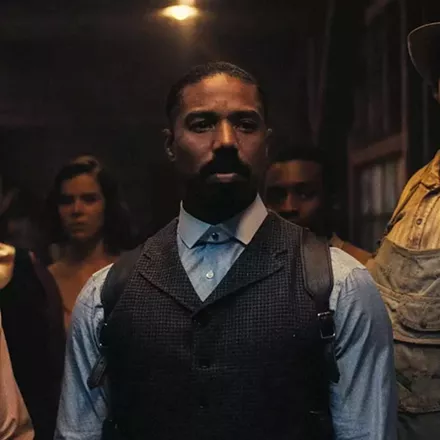PASSAGES feature movie review
Brilliantly capturing a toxic brand of artistic narcissism
By Scott Renshaw @scottrenshawWhen we first meet filmmaker Tomas Freiburg (Franz Rogowski)—the anti-hero of co-writer/director Ira Sachs' feature Passages—he's on the set of his latest movie in Paris. As he fusses with the actors over the position of their hands while holding drinks, or swinging their arms too much while descending a staircase, we get a glimpse of the clapboard for his movie. Like the movie we're watching, it's produced by SBS Productions; its title, like the movie we're watching, is Passages.
Tomas's movie seems to be a period piece, so it's not as though he's specifically creating a version of the story we're about to see unfold. No, the real point of having Sachs' movie and Tomas's movie share a title seems to be teaching us about the way Tomas treats his reality, in the way he treats his movies: as narratives over which he gets to exert control, even if he makes other people feel small in the process.
That's the dynamic that evolves at the wrap party for Tomas's movie, where he meets a young woman named Agathe (Adèle Exarchopoulos). They go back to her flat and have sex—and the next morning, Tomas has no problem immediately telling his husband of 15 years, Martin (Ben Whishaw), what took place. Tomas seems to think that their relationship can proceed with business as usual, but the ensuing attempt at a romantic triangle becomes one where it's clear that one side is always out of balance with the others.
Passages became the subject of a minor controversy over receiving an NC-17 rating for its sexual content—a decision that seemed predicated on the fact that much of the sex in question is gay, and inspired discussion that tended to bypass the question of why Sachs chose to include it. This is, to be sure, a fairly horny movie about a fairly horny guy, but it's also true that Sachs is exploring the different ways people respond to being intimate with someone. The sensual, physical acts that are portrayed—both between Tomas and Martin, and between Tomas and Agathe—take on a different perspective as it becomes clear that Tomas doesn't view them with the same emotional consequence as his partners do, particularly when a weekend getaway involving the three of them finds Tomas and Martin having sex while Agathe listens to them awkwardly through her bedroom wall.
And emotional consequence is at the center of Passages, as the script by Sachs and his regular collaborator Mauricia Zacharias probes the twists and turns taken by these relationships, including an unplanned pregnancy. Rogowski's performance magnificently evokes a certain kind of narcissistic artist so convinced that they feel things more deeply than the rest of the world that the feelings of the other people in their lives almost don't exist. Agathe understands this instinctively when she responds to Tomas saying he's falling in love with her by replying, "You say it when it works for you," though it doesn't prevent her from being drawn into his orbit. Both Whishaw and Exarchopoulos do excellent work, but are also effectively subordinate as the kind of relationships Tomas expects from people—ones where they'll be there for him when he needs them, and not get in his way when he doesn't.
Sachs complements this singular character study with unconventional filmmaking choices throughout. He cuts from an awkward bedtime silence between Tomas and Martin not to the kind of scene one might typically expect (pretending everything is normal the next day), but instead to the middle of the fight that clearly immediately ensued. There's wisdom even in a choice as simple as not revealing until the movie is nearly half over what both Martin and Agathe do for a living, almost as though we're seeing through Tomas's eyes how little the details of these people's lives matter when they're separate from him.
At just 92 minutes, Passages demonstrates a kind of narrative efficiency that's almost ruthless, potentially leaving a sense that you'd want to know more about how these lives shake out. Yet that's also part of what makes it stunning in its simplicity. We get to see Tomas wreck his own life through the fundamental inability to see those he claims to love as anything but supporting characters in a movie where he's the hero.
More by Scott Renshaw
-
Comedian Steve Hofstetter interview
On his comedy origins, dealing with hecklers, and how a Utah appearance helped define his on-stage sensibility
- Apr 23, 2025
-
Film review: THE ACCOUNTANT 2
Follow-up to the 2016 Ben Affleck action drama embraces the weird, for better or worse.
- Apr 23, 2025
-
Film Reviews: New Releases for April 18
Sinners, The Wedding Banquet, Sneaks, The Ugly Stepsister, One to One: John & Yoko
- Apr 17, 2025
- More »
Latest in Film Reviews
Readers also liked…
-
Sundance 2025 wrap-up plus February special screenings
Uncertainty about the future location shifts focus away from the movies
- Feb 5, 2025










